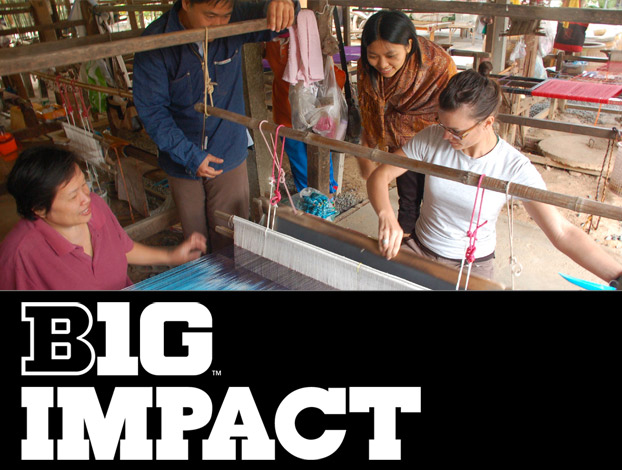
Brooke (Deffenbaugh) Mullen headed to Thailand hoping to immerse herself in a world that was different than any she’d ever known. What she hadn’t counted on was finding a way to make a difference in the lives of many.
Mullen, who graduated from UNL in 2007 with a bachelor’s degree in international studies and a minor in business, moved to Thailand in 2008 with her husband after getting married.
She found herself fascinated by the local markets and their handmade goods ranging from organic scarves made with natural dyes from tree bark and berries, as well as silver jewelry, hammered and shaped by hand from local hill tribe villagers. She forged personal friendships with many of the artisan communities and learned about the many challenges they face.
AN IDEA TO BRIDGE THE GAP
While on a trip to Myanmar (Burma), Mullen was introduced to a young Burmese woman whose impact was limited due to the lack of access to formal education.
“She was exceptionally compassionate, bright, and had a strong desire to contribute to her community and make a difference,” Mullen said of that artist. “We were so touched by her – it’s hard to put this into words. We kept thinking: How does one empower someone like her?”
Her contemplations eventually produced the idea for Sapahn, a business designed to bridge the economic gap for artists by connecting them with socially conscious buyers in the United States, and to mobilize other young leaders by clearing pathways to education. Sapahn means “bridge” in Thai. Mullen works closely with her artisans, building long-term relationships and allowing artisans to generate new product designs and set their prices in a “no-haggling” model.
The business was a way to address the complex challenges encountered in the artisan communities: It provided a market for artisans’ goods while generating scholarship money for that young woman in Myanmar who inspired the enterprise.
“What I observed in both the hills and city markets was a gap between the artists/makers and the buyer,” Mullen said. “I found these talented artists lacked access to buyers who would surely appreciate the process and impact made by these vibrant communities.”
SALES TURN INTO SCHOLARSHIPS
Mullen first tested the idea by filling two suitcases with handbags, scarves and jewelry made from several artists. Once in the United States, she invited friends and family to a trunk show. Nearly everything sold and Mullen came away with almost $1,000 to establish the scholarship fund. Today, a portion of Sapahn’s proceeds continues to support that fund.
Education is particularly important in Myanmar, Mullen said.
According to a report by the United Nation’s special rapporteur on human rights in Myanmar, fewer than 60 percent of children in Myanmar complete their primary education.
“Education goes hand-in-hand with the development of a country,” Mullen said.
GLOBAL CONNECTIONS STARTED AT UNL
She calls her own educational experience at UNL engaging. She’s grateful for participating in Charles Braithwaite’s Global Classroom project and leadership development opportunities with the Nebraska Human Resource Institute (NHRI), as well as having experiences with Cather Circle, a mentoring network for UNL alumnae and female students. The Global Classroom enables students to participate in classes with students from Turkey, Russia, Costa Rica, and elsewhere through video conferencing.
“These ‘exposure’ experiences provided a significant contribution to where I am today,” Mullen said.
Mullen is pursuing a master’s degree in human rights and social development at Mahidol University in Salaya, Thailand. Her thesis examines male human trafficking. Her interest in the topic stemmed from a six-month internship at the United Nations Inter-Agency Project on Human Trafficking where she helped create a regional reintegration research project, which is currently under way.
But she also remains committed to Sapahn, which has room to grow, she said.
“Sapahn has thrived as a result of the goodwill and efforts of many family and friends. I have been amazed by the amount of people in the United States and in Thailand who are eager to learn and contribute their expertise to one another,” she said.